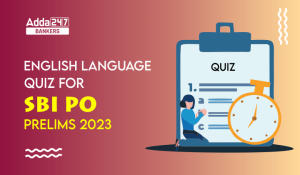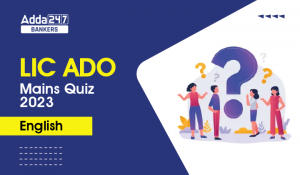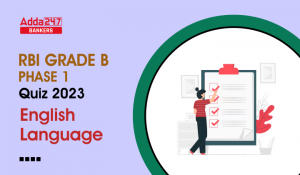IBPS Clerk Prelims is on its way and a lot of aspirants are heading towards new hopes with this upcoming opportunity. Thus, English Language can be an impetus for their success by helping them save crucial time and score good points in lesser time and effort. So, instead of boiling the ocean, try building up a strong vocabulary, an effective knowledge of grammar, and efficient comprehension skills so as to be on the ball to face this particular section. Here is a quiz on English Language being provided by Adda247 to let you practice the best of latest pattern English Questions for upcoming IBPS Clerk Exam.
Directions (1-10): Read the following passage carefully and answer the respective questions given below each of them. Certain words/phrases/sentences/Blanks have been printed in bold to help you locate them while answering some of the questions.
Back in the fifteenth century, in a tiny village near Nuremberg, lived a family with eighteen children. Eighteen! In order merely to keep food on the table for his big family, the father, a goldsmith by profession, worked almost eighteen hours a day at his shop and any other paying work he could find in the ____A____. Despite their seemingly hopeless condition, two of the eldest children had a dream. They both wanted to pursue their talent for art, but they knew well that their father would never be financially able to send either of them to Nuremberg to study at the academy.
After many long discussions at night in their crowded family bed, the two boys finally worked out a pact. (1) They would toss a coin. The loser would go down into the nearby mines and with his earnings, support his brother while he attended the academy. The winner of the toss will attend the academy first and complete his study. Once the first winner of the toss completes his study, he will help the other brother to attend the academy and support him financially by selling arts or working at the mines, if necessary.
They tossed a coin on a Sunday morning after church. Albrecht Durer, one of the brothers won the toss and went off to Nuremberg. Albert, the other brother went to work at the mines and for the next four years, financed his brother, whose work at the academy was almost an immediate sensation. Albrecht’s etchings, his woodcuts, and his oils were far better than most of his professors. By the time he graduated, he was beginning to earn considerable fees for his commissioned works.
When the young artist returned to his village, the Durer family held a festive dinner on their lawn to celebrate Albrecht’s triumphant homecoming. After a long and memorable meal, punctuated with music and laughter, Albrecht rose from his honoured position at the head of the table to drink a toast to his beloved brother for the years of sacrifice that had enabled Albrecht to fulfil his ambition. His closing words were, “And now, Albert, blessed brother of mine, now it is your turn. Now you can go to Nuremberg to pursue your dream and I will take care of you.” All heads turned in eager expectation to the far end of the table where Albert sat, (2) tears streaming down his pale face, shaking his lowered head from side to side while he sobbed.
Finally, Albert rose and wiped the tears from his cheeks. He glanced down the long table at the faces he loved, and then, holding his hands close to his right cheek, he said softly, “No, brother. I cannot go to Nuremberg. It is too late for me. Look what four years in the mines have done to my hands! The bones in every finger have been smashed at least once, and lately, I have been suffering from arthritis so badly in my right hand that I cannot even hold a glass to return your toast, much less make delicate lines on parchment or canvas with a pen or a brush. My brother, for me, it is too late.”
More than 450 years have passed by today. By now, Albrecht Durer’s hundreds of masterful portraits, pen and silver-point sketches, watercolours, charcoals, woodcuts, and copper engravings hang in every great museum in the world, but the odds are great that you, like most people, are familiar with only one of Albrecht Durer’s works. More than merely being familiar with it, you very well may have a reproduction hanging in your home or office.
One day, to pay homage to Albert for all that he had sacrificed, Albrecht Durer painstakingly drew his brother’s abused hands with palms together and thin fingers stretched skyward. He called his powerful drawing simply “Hands,” but the entire world almost immediately opened their hearts to his great masterpiece and renamed his tribute of love “The Praying Hands.”
Q1. Which of the following is the MOST SIMILAR in meaning to the word SENSATION given in the passage above?
Big
Excitement
Huge
Serious
Small
Solution:
SENSATION - A widespread reaction of interest and excitement.
Q2. In the above passage, a line (1) is given in BOLD. Which of the following can be inferred from it?
The two boys had long discussion with their father before deciding who will go to Nuremberg.
Albert decided that he will sacrifice his dream for his brother Albrecht.
Albert was the elder of the two brothers.
The two boys worked out a plan to decide by tossing a coin.
There were a lot of members in the family of the two boys.
Solution:
As the BOLD statement mentions ‘crowded family bed’, so it is very clear that there are a lot family members in the family of the two boys.
Q3. According to the above passage, which of the following statements is TRUE?
Albert was the elder brother of Albrecht.
Albrecht named the painting of his brother’s hands, “The Praying Hands”.
The father of the Durer brothers worked in a mine.
The story told in the above passage is about 4.5 centuries old.
None of the above is true.
Solution:
The first line of 6th paragraph clearly mentions that the story told is 450 years old.
Q4. Why could Albert not attend the academy with Albrecht?
Because Albert was not talented enough to get admission in the academy in Nuremberg.
Because his father did not have enough money to send him to Nuremberg.
Because he had lost the toss which decided who of the two brothers will go to Nuremberg.
Because Albrecht cheated on him.
Because one of the two brothers had to stay back home to take care of their ailing mother.
Solution:
The second para describes that the two brothers had decided to toss a coin in order to decide who of them would go to Nuremberg, and Albert had lost that toss.
Q5. In the passage above, a blank A has been given. Which of the following words fill the blank most accurately, grammatically as well as contextually?
Neighbourhood
Berlin
Slum
France
None of these
Solution:
Neighbourhood fits perfectly in the given blank and maintains the continuity of the sentence.
Q6. Which of the following best describes the moral of the story mentioned in the above passage?
One must always remember and acknowledge the contribution and sacrifice of others in one’s success.
If someone has made sacrifices for your success then you must repay by making a painting.
One who seizes the right opportunity at the right time succeeds in life.
You win some and lose some in life.
All of the above.
Solution:
Of all the options, option (a) very vividly put out the moral of the story told in the passage.
One must always remember and acknowledge the contribution and sacrifice of others in one’s success, just like Albrecht paid homage to Albert’s sacrifices.
One must always remember and acknowledge the contribution and sacrifice of others in one’s success, just like Albrecht paid homage to Albert’s sacrifices.
Q7. Which of the following statements is FALSE with respect to the above passage?
Albrecht went to Nuremberg to pursue his talent.
Albert damaged his hands while working in the mines.
Albrecht’s work was an instant sensation.
Albert refused to go to Nuremberg to pursue his dream.
Albrecht’s father cried of happiness to see his success.
Solution:
Sentence (e) is FALSE here. Nowhere in the passage has this been mentioned, whereas, all other statements are clearly mentioned in the passage.
Q8. In the above passage, a line (2) is given in BOLD. Which of the following can be inferred from it?
All the ladies sitting their turned towards Albert.
Albert sat on the far end of the table.
Albrecht sat on the other end of the table.
Albert cried at the offer made by Albrecht.
None of the above can be inferred from the BOLD statements.
Solution:
The BOLD has clearly mentioned that Albert sat on the far end of the table. Rest all statements cannot be inferred from the BOLD statement itself.
Q9. Which of the following is the MOST OPPOSITE in meaning to the word PAINSTAKINGLY given in the passage above?
Caring
Attentively
Enjoyable
Carelessly
Hateful
Solution:
PAINSTAKINGLY - with great care and thoroughness.
Hence, CARELESSLY is opposite in meaning to painstakingly.
Hence, CARELESSLY is opposite in meaning to painstakingly.
Q10. How many brothers did Albrecht have?
Not mentioned in the passage.
17
16
1
2
Solution:
The passage only mentions that the Durer family had 17 children – it nowhere talks about the gender of them. Hence, number of Albrecht’s brothers is not mentioned in the passage.
Directions (11-15): Read the following passage carefully and answer the respective questions given below each of them. Certain words/phrases/sentences have been printed in bold to help you locate them while answering some of the questions.
Anna was a 9-year-old girl from the small village. She finished attending elementary school till 4th grade at her village. For the 5th grade onwards, she had to get an admission in a school at a city nearby. She got very happy knowing that she was accepted in a very reputed school in the city. Today was the first day of her school and she was waiting for her school bus. Once the bus came, she got in it quickly. She was very excited.
Once the bus reached to her school, all students started going to their classes. Anna also made it to her classroom after asking fellow students for direction. Upon seeing her simple clothing and knowing she is from a small village, other students started making fun of her. The teacher soon arrived and she asked everyone to keep quiet. She introduced Anna to the class and told that she will be studying with them from today. Then the teacher told the students to be ready for the surprise test. She told everyone to write down the 7 wonders of the world. Everyone started writing the answer quickly. Anna started to write the answer slowly.
When everyone except Anna had submitted their answer paper, the teacher came and asked Anna, “What happened Dear? Don’t worry! Just write what you know as other students have learned about it just a couple of days back”. Anna replied, “I was thinking that there are so many things, which 7 I can pick to write!” And, then she handed her answer paper to the teacher. The teacher started reading everyone’s answers and the majority had answered them correctly such as The Great Wall of China, Colosseum, Stonehenge, Great Pyramid of Giza, Leaning Tower of Pisa, Tajmahal, Hanging Gardens of Babylon etc.
The teacher was happy as students had remembered what she had taught them. At last the teacher picked up Anna’s answer paper and started reading. She wrote, “The 7 Wonders are – To be able to See, To be able to Hear, To be able to Feel, To Laugh, To Think, To be Kind, To Love!” The teacher stood stunned and the whole class was dumbstruck. Today, a girl from the small village reminded them about the precious gifts that god has given us, which are truly a wonder.
Q11. Why did Anna take more time to submit her answer?
Because she was nervous.
Because she had not read the topic of seven wonders like the other students.
Because she was confused in picking the 7 wonders.
She was handicapped in her writing hand.
Not mentioned in the passage
Solution:
Para 3 of the passage describes that Anna was confused, when she says, “I was thinking that there are so many things, which 7 I can pick to write!”
Hence, option (c) is the correct answer choice.
Hence, option (c) is the correct answer choice.
Q12. Which of the following is not one of the seven wonders according to Anna?
Taj Mahal
Great Wall of China
Colosseum
Great Pyramid of Giza
None of the above
Solution:
None of Taj Mahal, Great Wall of China, Colosseum, or Great Pyramid of Giza is a wonder according to Anna. Her 7 wonders include - To be able to See, To be able to Hear, To be able to Feel, To Laugh, To Think, To be Kind, To Love.
Hence, option (e) is the correct answer choice here.
Hence, option (e) is the correct answer choice here.
Q13. Which of the following is MOST SIMILAR to the word DUMBSTRUCK as used in the passage above?
Dumb
Happy
Hit
Speechless
None of these
Solution:
DUMBSTRUCK - So shocked or surprised as to be unable to speak.
Q14. Why was Anna happy and excited?
Because she was given new dress and school bag by her parents.
Because she had gotten admission in a reputed school in the city.
Because she was appreciated by the teacher for her answer.
Because she had never rode on a school bus before as her previous school was in her neighbourhood.
None of the above.
Solution:
The first paragraph clearly mentions that Anna had gotten admission in a reputed school in the city and was very happy and excited about it. Therefore, option (b) is the correct answer choice here.
Q15. Why did the other students make fun of Anna?
Because she was wearing a colourful dress.
Because she did not know the answer to the question asked in the surprise test.
Because she was from a village.
Because she came to the school in a bullock cart.
None of these.
Solution:
Para 2 of the given passage clearly mentions that the other students started making fun of Anna upon seeing her simple clothing and knowing she is from a small village. Also, the passage nowhere mentions that she wore colourful dress.
Hence, option (c) is correct answer choice here.
Hence, option (c) is correct answer choice here.
You May also like to Read:
- Tips and Tricks To Solve Reading Comprehension
- Tips and Tricks to Solve Coherent Paragraph| Odd Sentence out
- 5 Tips and Tricks To Solve New Pattern Cloze Test





 English Language Quiz For SBI PO Prelims...
English Language Quiz For SBI PO Prelims...
 English Language Quiz For LIC ADO Mains ...
English Language Quiz For LIC ADO Mains ...
 English Language Quiz For For RBI Grade ...
English Language Quiz For For RBI Grade ...



